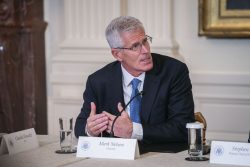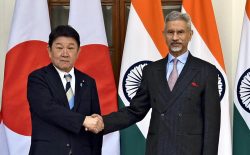
Ukraine’s President Volodymyr Zelenskiy, European Commission President Ursula von der Leyen and European Council President Charles Michel pose for a picture during a European Union (EU) summit, as Russia’s attack on Ukraine continues, in Kyiv, Ukraine February 3, 2023.
16:19 JST, December 15, 2023
BRUSSELS – The European Union on Thursday agreed to open membership talks with Ukraine, an important sign of support at a moment when battlefield progress has stalled and U.S. commitment to continued funding for the war has wavered.
Full E.U. membership is realistically many years away, but it was nonetheless a historic moment for Ukraine, which has pushed for years to join the bloc – to bind it closer to its allies in Europe, bolster its economy and give its citizens the right to live, work and travel freely across the continent.
“History is made by those who don’t get tired of fighting for freedom,” Ukrainian President Volodymyr Zelensky wrote in a celebratory post on X. European Council President Charles Michel called the decision “a very powerful political signal.”
After hours of deliberation, however, E.U. leaders failed to agree on a roughly $50 billion fund for Ukraine, highlighting division within the 27-country union and renewing questions about whether allies will really stand with Kyiv “as long as it takes.”
The agreement on membership talks came after weeks of resistance from Hungarian Prime Minister Viktor Orban, who maintains friendly relations with Russian President Vladimir Putin and has stalled E.U. decisions that are unfavorable for Moscow.
“Hungary’s Orban seems to be emboldened by the political gridlock over further Ukraine funding in Washington and disappointment with Ukraine’s counteroffensive,” Alissa de Carbonnel, deputy director of the Europe and Central Asia program at the International Crisis Group, wrote in an email.
On the eve of the summit, the European Commission announced it was unlocking more than $10 billion for Hungary that it had frozen in a novel effort to get member countries to abide by democratic principles. The commission said Wednesday that Hungary had now met conditions related to judicial independence.
Some insist the timing was coincidence. Others saw it as giving in to blackmail. In an interview with Bloomberg News this week, the top political adviser to Orban suggested that Hungary was indeed negotiating and that unblocking more money could move Hungary to change its tune on Ukraine.
On Thursday, Olga Stefanishyna, Ukrainian deputy prime minister for European and Euro-Atlantic integration, called out Orban and his antics. European Council decisions on Ukraine “are a piece of a much bigger puzzle,” she wrote in a post on X. “The stakes are too high to have someone play with it.”
Ultimately, Hungary did not get in the way of the Ukraine membership decision, which required unanimity. Orban left the room, leaving the decision to the other 26 leaders.
He wanted to avoid participating in a “completely senseless, irrational and incorrect decision,” he said in a video posted on X. “Hungary does not want to share in this bad decision, and for this reason, Hungary did not participate in the decision today,” he said.
Orban later posted that he had vetoed more money for Ukraine.
The leaders also agreed Thursday to open accession negotiations with Moldova, a neighbor of Ukraine that has similarly sought to strengthen ties with the bloc as it comes under pressure from Russia.
In recent weeks, Ukrainian officials and diplomats have tried, desperately, to shore up support in both the United States and Europe. A delegation of senior Ukrainian officials visited Washington this week to plead with lawmakers there for more funding. But they left with little to show for the effort, as Senate Republicans once again blocked the proposed aid package.
Nearly two years after Russia launched its full-scale invasion, while winter looms and supplies are low, financial support is needed to keep Ukraine running – and fighting – in the short-term, officials said. Progress on E.U. accession is also seen as critical, both for morale and for the message it sends to Russia.
Ukrainian official stressed that their country has worked hard to meet criteria for E.U. membership. But joining the E.U. typically takes many years. The political and legal systems of prospective members are scrutinized and slowly brought into compliance with E.U. rules.
Several countries, including Serbia, Montenegro, North Macedonia, Albania and Bosnia, have been in membership talks for years. Turkey applied to join in 1987 and officially remains a candidate, in theory, though it has effectively given up its push.
The fact that Ukraine is still at war makes its case more complicated. In Brussels, there is broad agreement that welcoming Ukraine into the bloc is the right thing to do, but much division about what that would mean for the E.U.
If Ukraine joined today, it would be the fifth most populous nation in the E.U. and its poorest by a wide margin, shifting the balance of power in the bloc and disrupting its internal market. Many believe key institutions would need to be rethought before Ukraine could join.
"News Services" POPULAR ARTICLE
-

Japan’s Princess Kako Marks 31st Birthday, Contributed to Key Events This Year
-

Arctic Sees Unprecedented Heat as Climate Impacts Cascade
-

Brigitte Bardot, 1960s Sultry sex Symbol Turned Militant Animal Rights Activist Dies at 91
-

At Least 7 Explosions and Low-Flying Aircraft Are Heard in Venezuela’s Caracas
-

South Korea Prosecutor Seeks Death Penalty for Ex-President Yoon over Martial Law (Update)
JN ACCESS RANKING
-

Japan Govt Adopts Measures to Curb Mega Solar Power Plant Projects Amid Environmental Concerns
-

Core Inflation in Tokyo Slows in December but Stays above BOJ Target
-

Major Japan Firms’ Average Winter Bonus Tops ¥1 Mil.
-

Tokyo Zoo Wolf Believed to Have Used Vegetation Growing on Wall to Climb, Escape; Animal Living Happily after Recapture
-

JAL, ANA Cancel Flights During 3-day Holiday Weekend due to Blizzard

























